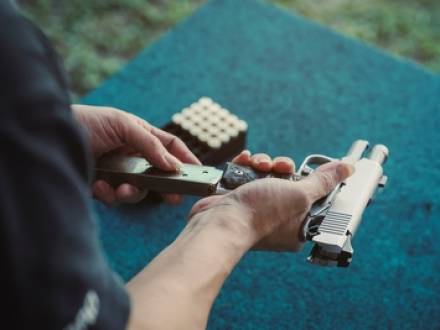How No "Stand Your Ground" Law Affects Self-Defense Claims
 When charged with assault or battery, the most common defenses include self-defense, defense of others, or defense of property. Twenty-eight states currently have "stand your ground" laws, which hold that a person who is attacked in a place where she or he has a lawful right to be has no duty to retreat. In stand-your-ground states, a person has the right to stand his or her ground and meet force with force.
When charged with assault or battery, the most common defenses include self-defense, defense of others, or defense of property. Twenty-eight states currently have "stand your ground" laws, which hold that a person who is attacked in a place where she or he has a lawful right to be has no duty to retreat. In stand-your-ground states, a person has the right to stand his or her ground and meet force with force.
This includes using deadly force if it is reasonably believed that deadly force was necessary to prevent death or great bodily harm to oneself or others or to prevent a felony in progress. This makes self-defense a legal defense for criminal charges of assault or battery in stand-your-ground states. Illinois is not a stand-your-ground state, although it does employ the castle doctrine.
While self-defense can still be a valid defense, it may come down to the level of self-defense employed. If you have been charged with a crime like assault or battery in the state of Illinois, it is important that you speak to a knowledgeable Chicago, IL criminal defense attorney who can comprehensively evaluate your charges and determine the best defense.
What Are the Differences Between the Castle Doctrine and Stand Your Ground?
The castle doctrine is a part of the state’s self-defense laws. This doctrine is specifically targeted at home invasion situations or any situation where a person is in their own home, and another person attempts to harm someone in the home or commit a burglary or theft. Illinois recognizes the rights of its residents to protect themselves, their families, and their homes.
Under the castle doctrine, residents have the right to use force – even deadly force – if they have a reasonable belief that deadly force is necessary to prevent an intruder from inflicting bodily harm or committing a felony. Remember, the castle doctrine only applies to a person’s home. Stand-your-ground laws allow the use of a proportional level of force to defend oneself, others, or one’s property at any location where there is a legal right to be.
Stand your ground laws, and the castle doctrine requires no duty to retreat. Since there is no stand-your-ground law in Illinois, if you are in a place where you are lawfully allowed to be and you are attacked, you are only allowed to use force when you have no way to make a safe escape – you have a duty to retreat whenever possible. If no retreat is possible, then you may only use force that is proportionate to the threat at hand. As you might imagine, this is a fairly subjective standard.
Can You Claim Self-Defense When Charged with Assault or Battery in Illinois?
Assault is making a threat to harm someone, while battery is the actual act of harming another person. You can still use self-defense as a valid defense against assault or battery charges (outside your home) if you cannot reasonably retreat from the situation and if your use of self-defense is proportional.
Essentially, this means you cannot bring a gun to a shouting match. If another person is verbally harassing you or even shoves you, pulling out a gun and shooting him or her is not considered self-defense in Illinois. A core aspect of claiming self-defense is whether the force used was "reasonable." This means that a belief that force was necessary must be reasonable to the average person in the same situation.
Contact a Cook County, IL Criminal Defense Lawyer
If you have been charged with assault or battery in the state, speaking to a Chicago, IL criminal defense attorney from Luisi Legal Group can be beneficial. Attorney Luisi is in the Chicago criminal courts on a daily basis. For the past 16 years, he has held a reputation as a highly skilled litigator for those charged with a criminal offense. Call 773-276-5541 to schedule your free consultation.







